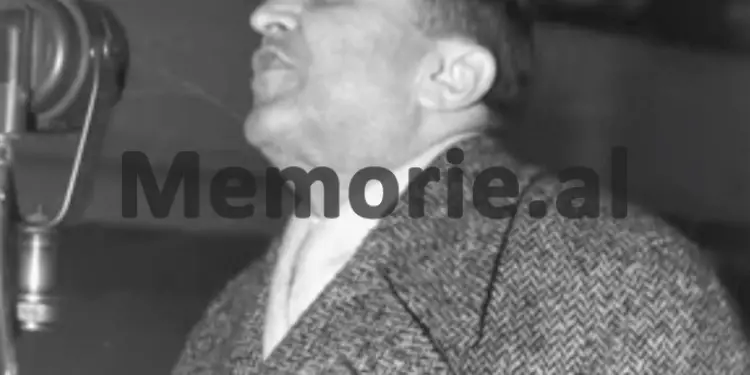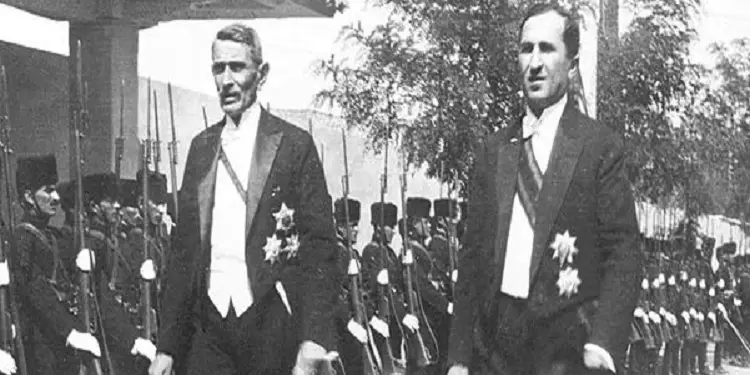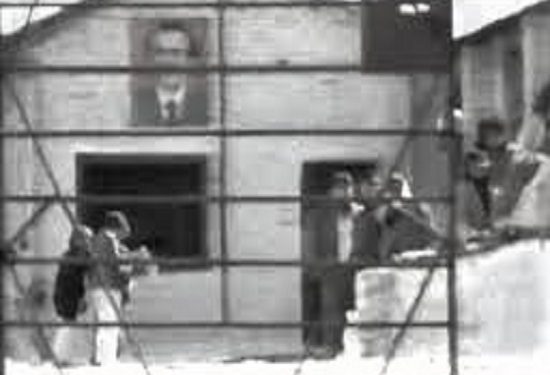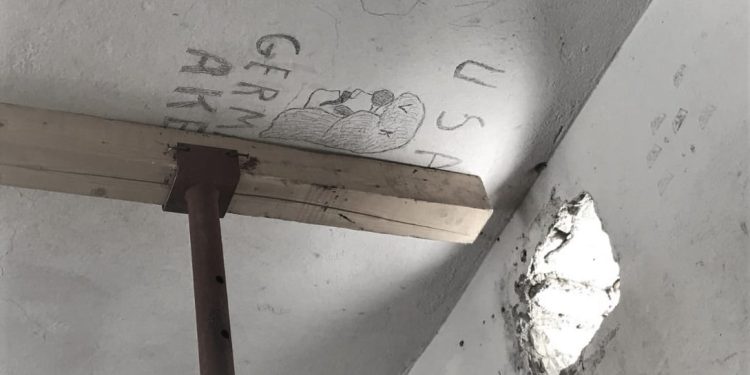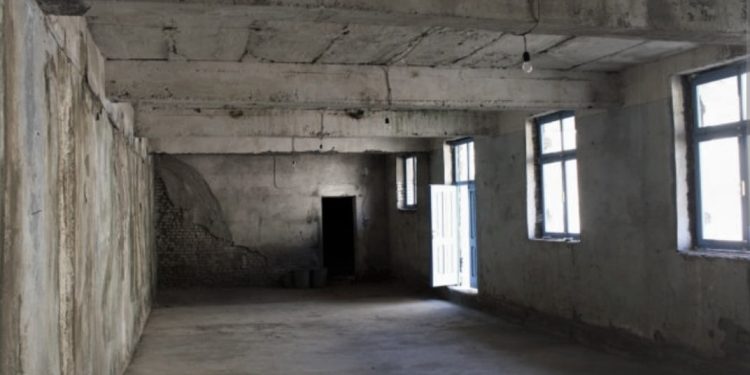From Uran Kalakulla
Second part
Memorie.al / Uran Rasim Kalakulla were born in Tirana in 1929, while the origin of their family is from Libohova in Gjirokastra. He completed his pedagogical studies in his native country and worked as a teacher of Albanian language and literature, in Berat and in the villages around Tirana. In 1960, he was arrested in a group for organizing a social-democratic party and was sentenced to death (by firing squad). After two months, his life was spared and he was sentenced to 25 years in prison, of which he served 21 years, mainly in Burrel. After prison, he was interned for 5 years in the villages of Kavaja. In 1991, he became the initiator of the creation of the National Society of Formerly Persecuted and Political Prisoners of Albania. In recent years, he has dedicated himself to writing and has published several books, including “Vergje ne pranga”, “Albanianism and its European trend”, “Arshi Pipa – the man and his works”, “21 years of communist prison”. Uran Kalakulla passed away in 2001. The text that we are publishing below is taken from the book “21 Years of Communist Prison”.
Continues from last issue
PORTRAITS OF PRISONERS
Would you rather have a horror ending or a horror without an ending?
In my opinion, the beatings, death-cutting tortures and outright killings of prisoners have not been everywhere and always at the same intensity. The greatest intensity was especially during the first ten years of communist rule, or something even further, when the greatest number of victims are counted, in relation to time, that is, when the terror and murders had reached their peak.
Cruel treatment, cruel and illegal tortures and murders, during nearly half a century of communist rule in our country, have not been linear, uniform. They are similar, if we continue with the mathematical language, both inside the prison and outside it, ∗ closely conditioned by the political situations and conjunctures of the time. They intensified when the threat to the absolute power of Hoxha and his followers appeared on the horizon, or when the economy was stagnant or worse.
When the situation somehow “calmed down” and when the illusion of the perpetuation of the miserable power grew, then the repression somewhat reduced its cruel streak, but never completely extinguished, because it is already known that the communist system itself in our unfortunate country does not could never live without repression. Because terror was his soul, his blood, his lymph, on which this system was built and with which it could survive. Otherwise, it could not be called a communist government.
This work happened, for comparison, exactly as in the life of a bloody, carnivorous beast. The communist power did not always have the same thirst for blood and victims. When she had had enough of them, as if she took some rest, it seems as if to digest what she had eaten, but she was still holding some half-alive victim in her bloody claws, crushing him between her paws…
The dilemma is very significant: Better a quick end with horror, or an endless horror? Those who were a decade or two behind me in prison met a harder end with horror, annihilation or quick death. As for the rest of us after them, an endless horror met us, a daily but equally painful death.
The first detainees in the different branches of the Security, the first prisoners of Burrel, the prison of the Castle of Gjirokastra, the camp-prison of Vloçishti, the camp-prison of Juba, etc., as well as the internees of Tepelena, experienced horrors even worse than ours, a quick death, full of horror.
As for the rest of us, an eternal horror and a slow death. However, such a reality cannot be divided as with a knife, because even during my imprisonment, the features of violence and torture often changed place and time. So we were not immune from the risk of a quick death with horror.
The prison camp of Spaçi, Qafë-Bar, and again the prison of Burrel, were very similar to those of Vloçisht, Juba and other torture and extermination camp-prisons. They are evidence of the tragic and inhumane reality of the communist prison.
The prison roll
The communist prison had two tasks: physical exhaustion to the extreme, through hard slave labor, bad food, dungeons and beatings, through repeated punishments and up to physical elimination and, secondly, deformation of the personality to the point of possible insanity, as well as degeneration morality of the given individual.
Who can resist these two traps, these two sly traps, he came out of prison a man than he was before, stronger, and more seasoned, more cultured with the knowledge of life, if not of books. , capable and ready for great work in the social field. There is no doubt that most of the generations of former political prisoners came out of such prison. Only a small part of them were broken and ended up half-human, morally and mentally.
The death chamber
My death chamber was a narrow dungeon, only one mattress could fit. It was indeed covered with boards, but they were all damp and moldy, a little more than it was located, not only adjacent to the needy of the “Dungeons of Kochi”, but also below its level, almost half a meter. And since the dividing wall between the two was brick, it is understandable what beautiful consequences it had.
On the upper part of the door, from its outer side, the words “chambers of death” were written clearly, in black letters, and, below them, a skull with two well-known crossed bones, like a pirate’s flag, or like the insignia of the Nazi SS.
This room had no windows, but (as I said), in the row of those dungeons (there were about ten of them), there were something like old chimneys on the ceiling, almost the size of a woman’s headscarf, through which light and air should enter.
From now on I was handcuffed (with my hands behind my back) and they were secured with a padlock so that I could not loosen them in the slightest. With these constant handcuffs I had to stay day and night, until the moment when I appeared before the firing squad…!
When I entered the dungeon I had a good chunk on my leg. I still had the fire of revolt, anger, indignation, hatred in my soul. There you had no place to behave, except to come around like a fugue. It was no more than a meter wide and a half long. I was almost like a tomb above the ground, with walls and a ceiling above, in a continuous semi-darkness…!
When your hands are tied in front is half the bad, because you can do several actions: eat, drink, pee, smoke a cigarette, fight the rats that enter the dungeon through the bottom crack of the door, to itch (at least the head and the front part of the body, which you have not washed for so long), but also to write.
But try doing these actions when these desolate hands are tied behind your back. You will be convinced that this is a very big, even fundamental change. I was bound so that I would not do any of these actions independently, but, of course, that I would also have no opportunity to kill myself and thus deprive our executioners of the pleasure of this work…!
Holding your hands back all the time, your shoulders start to hurt, but the biggest problem is when you sit down and lean against the wall. Handcuffs prevent you; they kill you in the convoy: even worse if you lie down to sleep. Anash can’t sleep on his side, because his arm finally touches his body and he becomes completely numb. You cannot lie on your back. It is understandable why. The only way: to sleep upside down. Even so, it still hurts, because with the arms behind it is very difficult to lie down. Then take your breath away.
I don’t know how others have done it, but I seem to have found a somewhat convenient way. I slept fitfully during the day, because I knew they were not coming to take me for execution. So, I stayed up all night with my face turned to the door, so that when they opened it, they would find me in front of me and ready…!
I don’t know how many days had passed since the death sentence, when one day (I think it was Tuesday), the door of my dungeon opened and before me appeared the crooked silhouette of Captain Rustem.
– “Get up, they are looking for you”!
– Who is looking for me?
– “I don’t know, but they are looking for you. Get up!”
At the door that separated the long corridor of the dungeons from a corridor of the investigation offices there, I saw a Sigurimi officer (as it appeared from his uniform)…!
When I got very close, he began to speak in a trembling voice, his mouth closing:
– “Look,” he said, almost stuttering in the Shkodran dialect, “have you met the family?”
– Meeting?!
– “Yes, meeting”.
I don’t know how it came to me. I felt a great shock in my soul. I felt that my heart began to beat faster in my chest, something like a sudden storm on the surface of the sea. As if a whirlwind lifted up the still, stagnant water, bearing like a gigantic eddy through the air: with billions of stars, all brightness and light spread around. I was used to my condition.
The gloomy stratification had already taken a permanent place in the soul. I had submitted to fate and expected nothing new but death. The officer’s words were a retreat from the edge of the grave to the realm of life. And this movement was not a little! However, I somehow managed to pull myself together and asked the officer who had the rank of first officer.
– Who came to the meeting?
– “I don’t know for sure, but it seems to me the woman with the son…”?!
He ordered me to be taken to the meeting place. Of course, he came with me. The place was in the grassy yard, between the prison and the series of dungeons. He put me in a corner of the wall, as if he wanted to hide me, and told me to wait there. They were really shocking moments and I was all eyes and ears.
After a while, I noticed a pair of small feet, wearing white shoes, approaching with light steps, towards the place where they had left me. And… the whole thing appeared before my eyes, my little soul, my adored son, for whom I forgot the whole world, with its good and bad.
I got ahead of him. A small, smiling face, with small upturned eyes, all cute, as white and tender as any child. I left him at two and a half years old. It was now four. He saw me too. He rushed at me full throttle. I scooped him up in my arms and held him hard, hard, smothering him with kisses and smelling him like a blooming flower. He had hugged me too and was hugging and kissing me longingly, without worrying that my shaved beard could pierce him…!
THE DARK SHADOW OF BURRELL PRISON
Every prison has an evil shadow. It is understandable why. But the shadow of Burrell’s prison had a special gloom, which smelled of death. Not for nothing, among the Albanian prisons of the Enverist dictatorship, Burrell has been called: the Dantesque “Ninth Circle of Hell”. Of course, he had many “friends” of his, all over the country, such as: Gjirokastra Castle Prison, Tirana New Prison, Shkodra Prison (better to say Shkodra prisons) and so on. But I don’t think I’m wrong when I say that Burrell’s had something special: the look of a monster.
And this monster always sits with its mouth open, and what goes into its mouth does not come out alive, but only a corpse. And this was proven by the communists themselves when, at the beginning of putting that prison into use, they put the name: “Prison of the enemies of the people” on its front, as well as a very cynical slogan, reminiscent of the one written at the entrance of Dante’s Inferno. Here, compare these slogans and you will see that they are quite similar, like two drops of water.
Dante’s Inferno:
“Abandon all hope, you who enter!
At the entrance of Burrell prison:
“Here they say to Burrel, who enters, does not leave”
Are you sure that the bejtexhi had some poetic Dantesque reminiscences?!
That prison got a bad name since it started to function as such, around 1946. The cream of the intelligentsia was locked up in it and many of them died there. The food was 400 gr. cornbread (molded) with a glass of water in 24 hours. There was no running water at that time, but only a well in the middle of the yard, where the prisoners, who had neither a winch nor a bucket, filled water with their self-made buckets, tied with string from trouble. The first commander of that prison was a sadist with the rank of lieutenant, with the cursed name: Vangjel Rëmbeci.
And until 1949, that prison was called the prison of extermination, because from hunger, from diseases, from cold, from humidity, from bad treatment in the rooms and from useless punishments in the dungeons, dozens of people lost their lives, a number that started to grow more and more. I don’t know the exact number of deaths in that prison, but I can say that during the time I spent there, for 14 consecutive years, dozens of convicts died and were maimed.
I remember some of them: Sazan Haderi, Salo Lezha, Karafil Koleci (died in the prisoners’ hospital in Tirana) and Mustafa Bajraktari. The former prime minister of King Zog, Koço Kotë, was killed by the policemen of Vangjel Rëmbec with spears, splattering his blood and brains on the walls of the dungeon.
The intellectual Xhevat Korça was made to die on hunger strike. Many patriotic intellectuals, prominent figures of the Albanian state and culture have died in that prison, among whom I can mention: Ethem Haxhiademi, Arqile Tasin, Xhavit Leskovik, Gjergj Kokoshin, and many others.
The latter was even a minister in Enver Hoxha’s first cabinet. In that prison they spent their ordeal and many other intellectuals, laymen or clerics such as: Zef Mala, Kudret Kokoshi, Suat Asllani, Arshi Pipa, Pater Mashkalla, Nikollë Mazreku, Hafiz Dërguti, Foto Bala, Andon Frashëri etc…! Memorie.al




